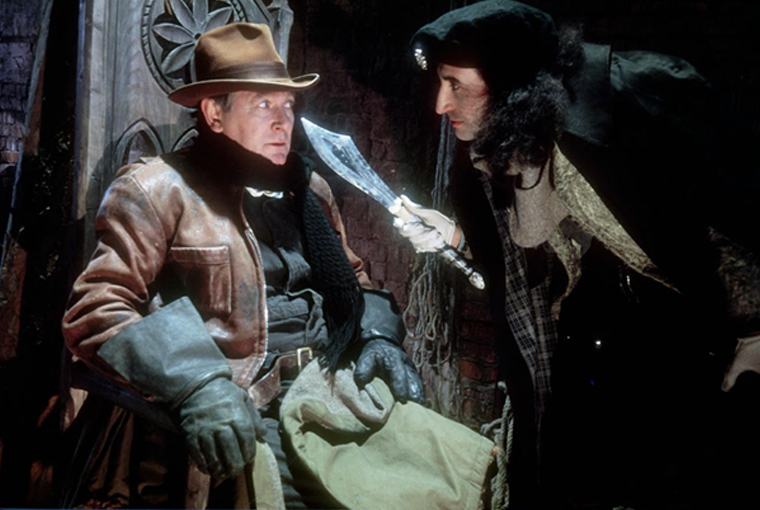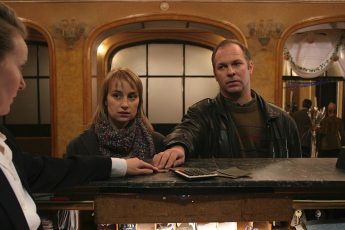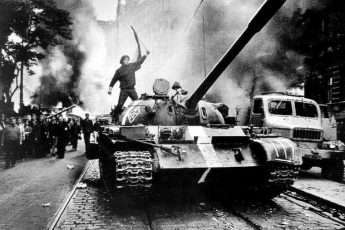At the End of History
Igor and Gleb Aleynikov’s Tractor Drivers 2 (Traktoristy 2, 1992)
Vol. 109 (November 2020) by Gordei Petrik
Tractor Drivers 2 by the brothers Igor and Gleb Aleynikov was produced at Mosfilm and marked Parallel Cinema’s zenith. It was one of only two films shot by marginal parallel directors at the central Soviet studios; the first one, Daddy, Father Frost is Dead, was made in 1991 by Necrorealist director Evgeny Yufit at Lenfilm. Tractor Drivers 2 was Mosfilm’s only parallel film project and its production literally took place at the end of an era: in 1991, at the height of the production process, the Soviet Union would fall apart.
By today’s standards, it is impossible to understand how the Aleynikov brothers were allowed to enter the premises of Mosfilm. Even among the parallel directors, Igor and Gleb Aleynikov were the most outrageous. In their previous films they despised any form of conformity and consistency. They made their films at the behest of the heart, guided solely by intuition. They did stylizations of different genres, mockumentaries and found footage made of newsreels. Sometimes the production lasted only a day, sometimes a week, in rare cases a month. They filmed with whatever equipment they could get hold of and wherever it was most convenient to shoot (of course without permission, as it was impossible to get one as an independent director, even during perestroika).
Tractor Drivers 2 was their first “normal” film, made with a real budget that opened up huge possibilities. With Mosfilm they suddenly had a whole studio, a real one, with real equipment at their hands, not like Yufit during Mzhalalafilm or Yukhananov during Theater Theater, both of which had nothing in common with Mosfilm except the abstract idea of making a film. At the same time, as the Aleynikovs worked at Mosfilm, the popular Soviet comedy director Leonid Gaidai was finishing a film with the eccentric title “There’s Good Weather in Deribasovskaya, Or It’s Raining Again in Brighton Beach”. All of that is at least very strange and was obviously only possible to happen in the motley year of 1991.
In order to explain to an international reader the gems of Tractor Drivers 2, it is necessary to dedicate a brief side note to the special character of 1930s Soviet cinema. In fact, almost all Soviet films of that historical period — in one way or another — were conditioned by Socialist Realism’s doctrine of depicting reality in a way that serves the Socialist utopia. But the reality shown in these films was so strikingly different from real Soviet life that by the 1990s, when the veil of the Soviet myth had finally dissipated, young people began to perceive most films shot before 1953 as nothing but grotesque comedies.
The Aleynikov brothers were the first to scoff at Stalinist myth-making not only in underground circles, but on a country-wide scale (the very first director to do so had been Maksim Pezhemsky in 1990 with his short film Comrade Chkalov Crosses the North Pole, a shameless parody of the celebrated war film Chapaev, personally beloved by Stalin). The Aleynikovs realized their film in the studio where all Soviet film classics were made, which of course is highly symbolic in these last years of the Soviet empire. Among the directors of the Parallel Cinema, the Aleynikovs were willfully considered post-conceptualists because the two brothers built their films not on references to someone else’s works (as postmodernists usually do), but on self-citation.
They made films based on their own previously recorded dialogues (e.g. “I am cold and so what?”), acted themselves in different scenes, called each other by their real names on screen, and explicitly referred to their previous films or the reputation of their closest comrades, as happens with Evgeny Chorba and Boris Yukhananov in Aquarium Fish of this World. Tractor Drivers 2 represents a completely new level of self-citation in Russian cinema. The brothers share their surname with a symbol of Soviet propaganda films of the 1930s — Peter Aleynikov; in fact, the brothers chose Peter Aleynikov’s most ridiculous film as their satirical reference, the comedy drama Tractor Drivers (Traktoristy, 1939), shot by the six-time winner of the Stalin Prize Ivan Pyriev.
According to the plot of the original film, the demobilized tanker Klim Yarko returns from the Far East to Ukraine to plough his native land on a tractor; Klim then falls in love with the tractor driver and Stakhanovite Mariana Bazhan. Mariana seems to reciprocate his feelings. At the same time another tractor driver, Nazar Duma, enters the story. A romantic story develops from these plot components in which the main purpose of the characters’ being is revealed to be not love, but hard work on arable land. In their “adaption” of Pyriev’s story, the Aleynikovs generally repeat the plot, leaving in the key scenes and the climax, retaining the characters’ names and even the kolkhoz scenery. However, they transfer the action into the early 1990s, the beginning of an infamous era of bandits and racketeering.
In Tractor Drivers 2, bandit groups appear instead of workers’ associations. Instead of regular vests, the protagonists are wearing the so-called firmach, vests typical for the late Soviet Union. Instead of the Pravda magazine, which had famously printed photographs of Soviet Stakhanovites in the 1930s, there is the perestroika magazine Sobesednik. Mariana Bazhan drinks gin all the time and in the dining car they serve Western cocktails. Every object in Tractor Drivers 2 appears through the prism of the directors’ shameless irony. They just say what they want to say and laugh at things that seem funny to their postmodern minds, thereby shocking a conservative audience. From time to time, the group of bandits led by Boris Yukhananov pour out directly towards the camera. Sometimes they even perform some lyrical compositions praising the Orthodox Church. Maybe it is also worth pointing out that besides Yukhananov, we find other important persons from the Parallel Cinema movement among the bandits, such as Alexander Dulerain, Oleg Dobrovolsky and Gleb Aleynikov himself.
The film’s main character Klim (played by cult director Evgeny “Debil” Kondratiev) determines what’s wrong with the tractor by just listening to the noise it makes for a second. He then dances stupidly, shouts out outlandish Soviet songs and completely distorts any technical terms. In one scene, he even watches one of his own — that is Evgeny Kondratiev’s — experimental films on the big screen. And after citing the loud toast “Have fun, lads, but be ready at every moment to meet the enemy”, which had ended Pyriev’s film on a solemn note, the Aleynikovs begin a wild and very funny bacchanal battle between the hero, performed by Kondratiev, and the bandit, performed by Yukhananov, and dozens of their by now completely shitfaced comrades.
With the final credits of Tractor Drivers 2, the movement of Parallel Cinema in the Soviet Union comes to an end. The film was released in 1992 and only two years later, Igor Aleynikov died in a plane crash. This tragic event, and the decision to start collaborating with large film studios, were the reasons for this chaotically formed movement to suddenly expire. This seems to be the almost inevitable destiny for the art of the independent, daring and young artists, incapable of compromise, which the Aleynikovs had always been.




Leave a Comment